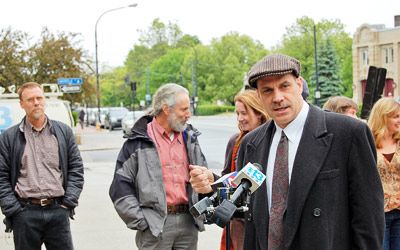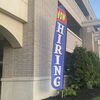Union contract sets stage for MaineToday changes
 Photo/Whit Richardson
Tom Bell, right, president of the Portland Newspaper Guild, at a 2009 press conference
Photo/Whit Richardson
Tom Bell, right, president of the Portland Newspaper Guild, at a 2009 press conference
Maine's largest newspaper union has agreed to a new contract that will allow MaineToday Media Inc., publisher of the Portland Press Herald, Kennebec Journal and other Maine newspapers, to alter the way it provides news and generates revenues.
MaineToday Media and the Portland Newspaper Guild Local 128, which represents more than 200 workers at the Press Herald, Maine Sunday Telegram and Morning Sentinel's newsroom, finalized a new 18-month contract this week. The contract allows the company to hire part-time writers to provide local news coverage, and also enables salespeople to sell ads across all MaineToday Media's platforms rather than just print or digital, according to a consultant who's been working with the company.
"That was a key principle, not just for the owners but for fairness," Neil Heyside says, referring to advertising staff who sold only print ads. "As print revenue is dropping, their income would drop."
Heyside is a managing director for CRG Partners, a consulting firm based in New York City. While Heyside wouldn't comment on the scope of his work with MaineTodayMedia, he spoke with Mainebiz on Wednesday about the company's future strategy, which includes investing in technology infrastructure to "support the transition from print-centric to multimedia."
"The company is going to significantly invest in technology, and therefore the union needed to support the ability for the company to manage that," Heyside says. "The union backed it fully."
Tom Bell, the guild's president and a Press Herald reporter, said the union didn't accept any monetary concessions to support the company's new direction, but rather altered the guild's jurisdiction to enable the company to be more flexible in hiring part-time staff to cover communities in the paper's circulation area. For the Portland Press Herald, this area includes Cumberland, Sagadahoc and York counties.
Bell says Portland and the core communities nearby will be covered by full-time journalists, but part-timers will cover outlying towns, "helping fill the void, if you will," he says. "We're going to be able to do a better job competing with other media on local news coverage, which has suffered because of the loss of news reporting staff. These will be people who live in communities, working part time. They'll be going to town council meetings, planning board meetings and be trained in the technology of newspapers."
Bell says the Press Herald also plans to eventually adopt a paywall, making users pay to access the website's news and information.
Rick Edmonds, a researcher and writer for Poynter Institute on business and journalism issues, says in the last 18 months he's seen more struggling newspapers using correspondents to provide local coverage, rather than full-time staffers, including the Boston Globe. While Edmonds views this tactic as a realistic response to lean newspaper budgets, he says he hasn't seen it yet draw in greater revenues. "I don't think it's turned the industry around or anything like that. It does make for a more complete report. I haven't seen strong demonstration that it's attracted big audiences or advertising," he says.
Several MaineToday Media managers did not respond to requests for comment for this story.
The changes come at a tumultuous time for MaineToday Media. In October, MaineToday Media announced it was shedding 61 jobs. Soon after, CEO Richard Connor, who had managed the company since he and other investors bought it in 2009, resigned, as did President Dale Duncan. Then a paper company in North Carolina, McGrann Paper Corp., filed a lawsuit against MaineToday Media in early November for unpaid bills. HM Capital Partners, a private equity firm based in Dallas, is heavily invested in MaineToday Media.
Despite this trouble, Bell says the company is still generating "a lot of revenue. The consultants, CRG, have analyzed the company's situation and determined we have a solid future. We are a viable business. They definitely believe that we're a great brand, and we cover a strong market area," he says.
Since Connor bought the company, MaineToday Media has downsized from 560 employees to under 400. It is unclear how many part-time writers the company might hire to bulk up its coverage. Heyside says the number has not been defined yet, but Bell says hiring could start early next year.
Greg Kesich, the Press Herald editorial page editor and the guild's vice president, says the paper used to hire stringers 20 years or so ago, but over time as revenues grew, the paper opted instead to increase professional news staff. Now, Kesich says, "We need more feet on the street. We have some very hard-working people doing a tremendous job, but we need more people, and barring a sudden turnaround in the national economy, that's not going to happen. So we need to be more creative and get more people under these circumstances."
The new guild contract provides labor protections to part-time employees and pays them the same wage as news assistants, who can earn from $14.67 to $17.62 per hour, according to the new contract. They are also eligible for benefits if they work a certain number of hours per year. "This will give the position more status, attract higher-quality people and allow the paper to invest in their training," Bell says.
The contract attempts to protect full-time workers by preventing the company from hiring part-timers who would eliminate or displace full-time employees. "Correspondents closer to Portland will be more limited because we want to protect the jurisdiction of our reporters," Bell says. "We don't want them to never hire a full-time reporter again."
To help facilitate more local coverage, MaineToday Media plans to invest in upgrading the paper's content management system and technology to improve circulation and subscriptions, according to Heyside. Bell says under Connor's management, the paper was "investing in the wrong places and spending money in the wrong places. We needed to spend more money on our technology, and we didn't."
Attempts to reach Connor before deadline were not successful.
Without pinpointing a specific investment in these upgrades, Heyside says the cost should fall roughly in the six-figure range. He says investing in the training of the staff to use the technology differently would require a bigger commitment.
"The reality is that years ago, there were huge upfront costs to changing these systems, which is why the businesses didn't do it. But now with cloud-based [technology] you pay on a monthly basis [following installation]," he says. "The investment in the people is the most significant one. And to be honest, that was why we were able to work with the union to such a degree, because in effect a lot of their members would be unemployable," adding journalists need more than writing talent in a multimedia world.
Bell says the union agreed to the new contract in part because workers support the company's investment in technology. "What this agreement does, it gives the owners some peace of mind, that if they make this investment, we're going to embrace it," Bell says.










Comments